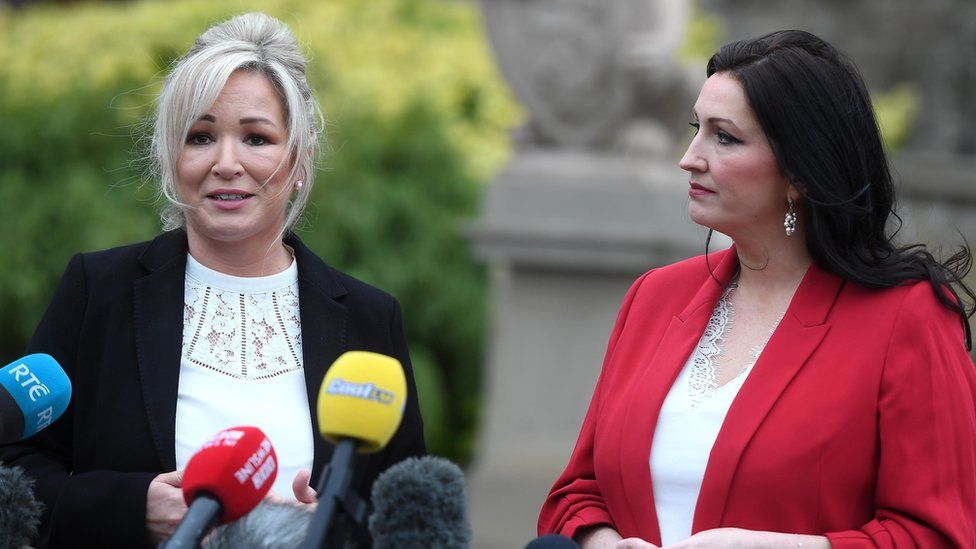
Michelle O’Neill and Emma Little-Pengelly lead Northern Ireland’s governing Executive
By Jayne McCormack & John Campbell
BBC News NI
Stormont is facing another financial ‘cliff edge’ in 2026 an independent budget watchdog has warned.
The NI Fiscal Council (NIFC) has analysed the impact of the £3.3bn financial package and says future cuts may be needed to run a balanced budget.
Stormont ministers are gathering for the first substantive meeting of the Executive since power-sharing returned after a 24-month hiatus.
Public finances and childcare provision in Northern Ireland are on the agenda.
In a report, the NIFC warns that once the short term elements of the package are exhausted ministers may have to raise revenue or make cuts.
Speaking to BBC News NI, the Chair of the Northern Ireland Fiscal Council Sir Robert Chote said some of the help provided by the financial package “tails off really quite sharply” from around £750 million per year over the next two years, to around £300 million.
“It’s not obvious why you would have that cliff-edge designed into a financial package but presumably the UK government thinks that should give enough time for the executive to take decisive action on revenue raising, budget saving, on public service reform,” he said.
“Some people will ask if that’s a realistic time table.”
The report also suggests that the ambition to fund NI public services at their level of need will not be achieved until the 2030s.
The UK government has asked ministers to raise a minimum of £113m.
Ministers are expected to get an update from Caoimhe Archibald about the current budgetary position
However, Northern Ireland parties want more funding from the UK Treasury and insist they did not commit to revenue raising as part of the deal agreed with the government.
On Thursday, ministers will get an update from Finance Minister Caoimhe Archibald about the current budgetary position.
It is understood that talks will be held between Ms Archibald’s department and Treasury officials in the coming days.
These are understood to be part of negotiations about Stormont’s finances for 2024-25 and the conditions the government is asking the Executive to adhere to.
Negotiations between different Stormont departments and trade unions over long-running pay deals is also likely to feature during Thursday’s meeting.
Education Minister Paul Givan had already said he will update the Executive about plans to improve childcare provision in Northern Ireland.
‘Left behind’
Earlier this week, he said up to £400m could be needed to develop and implement a new early learning and childcare strategy.
There is no scheme currently in place for free childcare in Northern Ireland, with some parents in Northern Ireland saying they are being left behind as other parts of the UK benefit from childcare support measures.
Image source, Getty Images
There is no scheme currently in place for free childcare in Northern Ireland
On Wednesday, First Minister Michelle O’Neill said if the Executive was to do “one thing well” in the short-term, it should be delivering on childcare and making it a key priority.
She also ruled out a 15% increase in the regional rate as a means of raising revenue, a figure which according to previous government estimations could raise £113m.
Rates are a property tax which help fund public services in Northern Ireland.
Stormont is responsible for setting the domestic regional rate and while Ms O’Neill ruled out any dramatic rise, an inflation-only increase would still mean adding at least 4% to bills for the next financial year.
In Thursday’s report the NI Fiscal Council suggested mistakes of the past could be repeated in how Stormont is funded.
It continued to reference the short term cash injection Stormont received in the New Decade New Approach deal and that “the Executive was not able to sustain its initial momentum.”
The Wales model
The financial package includes one-off funding of up to £584m to meet public sector pay pressures and a two year ‘stabilisation’ fund of more than £1bn.
There is also a move towards a ‘needs based’ funding of public services, based on the model in Wales, which recognises that it costs more to deliver public services in Wales and Northern Ireland of an equivalent standard to those provided in England.
In Wales £115 is allocated for every £100 per head spent on public services in England.
Image source, Getty Images
It’s estimated that the relative spending need for public services in NI is £124
The relative spending need for NI is estimated to be £124 but the NIFC warns that under the current deal that level of need would not be met until around 2035.
NI is currently estimated to be funded at a level of around £120.
The NIFC said whilst the uplift will help move public service funding onto a more sustainable long-term footing it does not address the short-term budget crisis.
Stormont ministers have been making the case that the needs-based part of the deal needs to be revisited to get to the £124 level much sooner.
‘Expectation’ for revenue raising measures
The Social Democratic and Labour Party’s Matthew O’Toole, who is leader of the opposition, said from initial discussions with the UK government in December there was a “fairly clear expectation” that revenue raising was an expectation.
“I do think it’s a bit disingenuous now to make out that was sort of not there or in the ether,” he said.
Deputy First Minister Emma Little-Pengelly, of the Democratic Unionist Party (DUP), said it was the “wrong time” to be proposing revenue-raising.
“We’ll be making the case very strongly that hard-pressed families in Northern Ireland are under enough financial pressure at the moment,” she said.
“This is the wrong time for this sort of proposal.”
Their comments came as the top civil servant in Stormont’s Department of Finance, Neil Gibson, said officials have not yet been asked to begin work on revenue raising.








